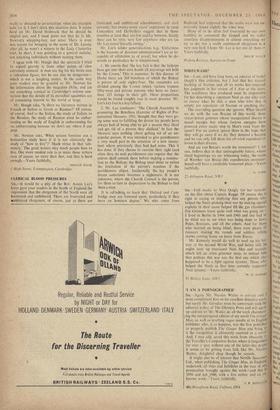SIR,—It would be a pity of the Rev. Austin Lee's
letter gave your readers in the South of England the impression that the clergymen of the North were all frustrated and embittered. There are frustrated and ambiitered clergymen, of course, just as there are frustrated and embittered schoolmasters and civil servants; but twenty-seven years' experience in rural Lancashire and Derbyshire suggest that in those counties at least they are few and far between. Surely there can be very, very few anywhere who are (as Mr. Lee avers) 'literally rotting.'
Mr. Lee's wilder generalisations (e.g. 'Unfairness is the keynote of diocesan administration') are as in- capable of refutation as of proof; but when he de- scends to particulars he is misinformed.
I. He asserts that 'the key fact is that the bishops have got into their own hands all patronage not held by the Crown.' This is nonsense. In this diocese of Derby there arc 269 benefices of which the Bishop is patron of only eighty-four. The remainder are diVided among the Crown (nine), various trustees tlifty-two) and private patrons who have no fewer than 123 livings in their gift. These proportions would be found roughly true in most dioceses. Mr. Lee's key fact is a key fallacy.
2. Mr. Lee continues: 'The Church Assembly in promoting the Benefices (Exercise of Rights of Pre- sentation) Measure, 1931, thought that they were go- ing some way to fulfilling the dream lay people have always had of being able to get a parson they liked and get rid of a parson they disliked.' In fact the Measure says nothing about getting rid of an un- popular parson. It was intended to give parishioners a very small part in the selection of a new incum- bent where previously they had had none. This it has done. If they choose to exercise their right (and often they do not) parishioners can require that the patron shall consult them before making a nomina- tion to the Bishop; the Bishop must defer or refuse the institution of the patron's nominee if the parishioners object. Incidentally the lay people's dream sometimes becomes a nightmare. It is not unknown, where the Church Council is the patron, for them to turn in desperation to the Bishop to find them a man.
It is refreshing to learn that 'Oxford and Cam- bridge men are frowned upon, particularly if they have an 'honours degree.' We who come from 'Redbrick had supposed that the scales were not tin. naturally tipped slightly the other way.
Many of us do often feel frustrated by our own inability to commend the Gospel and we suffer countless disappointments in almost everything w't try to do; but a really embittered clergyman is 4, very rare bird. I hope Mr. Lee is not one of them.— Yours faithfully,
PHILIP \\ Walton Rectory, Burton-on-Trent


























 Previous page
Previous page